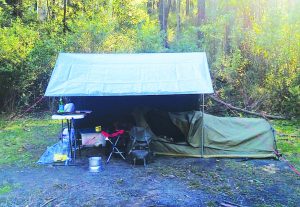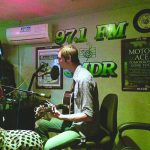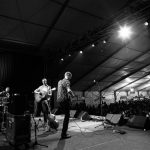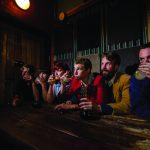Ex-Pat Files: Skyscraper Stan
Ex-Pat Files: Skyscraper Stan
While his music is typically quirky but dark modern folk, Skyscraper Stan made quite a splash with Kiwi audiences attending the David Bowie tribute gigs that toured the country following his death this year. Spectacularly tall, outrageously dressed and awkwardly limbed, Stan Woodhouse could nonetheless channel glam-phase Bowie impressively. And what a voice. Recorded in Melbourne and just released here in NZ, his own debut album is called ‘Last Year’s Tune’. Stan talked candidly about playing solo around Australia with Silke Hartung.
When Stan Woodhouse, aka Skyscraper Stan, says he lives a very transient kind of life in Australia he isn’t kidding, the photo below shows his ‘swag’ – that’s home to you and I.
“For a long time when I’ve been sedentary, I’ve been in Fitzroy, or suburbs nearby, but I haven’t had a fixed address for a year and a bit. I kind of just drive around…”
It’s not aimless driving though, he’s signed to a Sydney booking agency who know that he really wants to work all the time, so they book him on those big long solo tours that Aussie can offer the hardy. There’s still a lot of regional touring to be done there, playing those once grand old pubs from back when there still was gold.
“You drive through gold country and you’ve got those old towns with corner hotels that have big rooms upstairs. Quite often the venue will have a bed for you. A lot of the time I’ll play at a venue and they’ll let me put the swag out in a driveway. If I don’t have a gig, I’ll often stop by the side of the road close to where truckers stop, and go a little into the bush from there. I have a swag, which is an Australian thing. You would have heard the word ‘swagman’ in Waltzing Matilda – a swag is a canvas tube with a mattress in it.”
If he plays enough nights a week, he mostly has a free place to stay.
“It’s when I don’t have as many gigs, that’s when I struggle to have a place to sleep.”
Named ‘Skyscraper Stan’ by Tom Rodwell and Rohan Evans back in the days when he was a barman and occasional performer at Auckland’s Wine Cellar, Stan moved to Australia seven years ago, basing himself in Melbourne. He admits he didn’t expect it to be that cold.
“Melbourne gets really cold, and it’s really wet in the winter. I can’t live in my swag in Victoria in the winter. The cold is okay, the wet is horrible.”
Of course cold and wet is just a part of the Aussie challenge.
“When you drive through central NSW, Victoria or through Queensland where the humidity is high but it’s also 40 degrees. The dry heat down south gets really bad, so every now and then you get 35 degrees and then I worry about my guitar in the car.”
He plays a Maton, the Australian guitar manufacturer also based in Melbourne. An artist liaison from the company approached him after a folk festival show offering sponsorship.
“He gave me this guitar and I have totally fallen in love with it now. It’s absolutely incredible. I have no idea which model I’m playing, but it’s sort of a smaller dreadnought guitar that makes me look huge. Not a big guitar but wonderful to play. I had to fall in love with it. I was playing a really old 1951 Silvertone, which looked great but played like shit.”
Stan sees himself as a songwriter more so than a musician.
“I’m at a competent level on the guitar but I’m no virtuoso. I’ve got a lot of friends who are really talented musicians and I can’t keep up with that, the way their mind works. But as long as you surround yourself with them and include them in your band you’re always going to sound like an amazing musician because they’re all covering your gaps!”
Before leaving NZ he was studying biology at Auckland University and working at the Wine Cellar, where he threw himself a combined 21st birthday/going away party.
“My band played and we had Mason Clinic play. I had this idea that NZ was this place I wanted to leave and never come back to because I been reading too many stories about people like Woody Guthrie, the American dream, being a rambling man – I was an arrogant little shit, basically. I moved to a place that’s less than four hours away but still mostly New Zealanders.
“I always found something quite alluring about Australia. It’s got cultural problems, and it does violate human rights, they do all sorts of horrible things, so it can be really embarrassing to live in Australia right now, but it’s a pretty remarkable and inspiring place. The physical environment at least.
His father is Australian and Stan was born in Sydney, but grew up in Auckland. He now has an Aussie passport and as he says, could go on the dole if he wanted to. While finishing his degree at Melbourne University he was soon drawn to the local music scene. In the beginning, no one would give him a gig and he says it can be quite a catty scene.
“I found it pretty hard to break into the scene at first but once I did it became quite supportive. I was kind of a dorky, awkward, super skinny, really unco-ordinated, lanky kind of country blues singer at the time, and it took me a fair while to get gigs. It wasn’t actually until I left Melbourne. I had been living there for eight months without playing any shows, living with lots of druggies and junkies and bongheads – just not good people.
“I’d go in and ask for a gig and they’d ask me for demos and I didn’t have any demos. I would just struggle. I don’t think I was very good at asking for shows, came across as awkward and weird and they probably thought, ‘Well if you’re this bad at talking to people, what are you going to do when you get on stage?’”
Scraping some money together he bought a stationwagon and then with his girlfriend took off to NSW.
“We went to a town called Tamworth where they do the Tamworth Music Festival – it’s a nightmare! It’s 40 degrees every day and there are all these middle aged men in washed out denim and fake Stetson hats who have no respect for women at all, so it was really hard for my girlfriend at the time. Everyone’s just drinking all day long, for 10 days, so by the end people are just punching on – that’s an Aussie term for getting in a punch up.
While there he did meet a bunch of musicians whose gigs he’d been to. Getting a gig at a photo studio above a toy store he got all these “cool guys” Melbourne musos in with guest passes, making himself feel “really cool”.
Even better, when he got back to Melbourne they started hooking him up with gigs. Now he reckons that it’s probably easier to get gigs there than it is in Auckland because there are so many venues in Melbourne, including a lot of smaller ones.
“I haven’t played there for a while but there’s a bar called the Old Bar, which I think is kind of like the Melbourne Wine Cellar. It’s dirty and you stick to the floor – at least the Wine Cellar isn’t carpeted! You stick to it! One of our backing singers stepped up on the stage and the sole of her shoe stayed on the floor!”
He has also lived in Sydney on and off, and finds it easy enough to get a gig there, too.
“Small venues are very popular in Australia right now. When I say small venues I kind of mean a place that can fit between 50-80 people. Tiny little cocktail bars but they have music.”
And while it’s hardly riches, he says he does get paid well for playing, which is why he tours often.
“Say the Central Tablelands, inland NSW. If I go out there on a Thursday night I get a AU$250 gig, on a Friday I can do a AU$400 gig, on a Saturday AU$600 and on Sunday AU$300. I’ve worked four days but I’ve made good money! I don’t know if I could do that here, but you can there. You just got to be willing to live in a swag and drive around in a crappy old Mazda that sounds like a lawnmower.”
Stan’s self-managed but says it’s super helpful to have the Sydney-based Harbour Agency booking gigs for him and avoiding the hassle and hours of admin emailing venues and putting his own tour runs together. Aside from that as an independent musician booking gigs you can’t get venues to someone sign a contract – and there’s no such thing as a short drive in Australia.
“I’ve had many experiences where I trusted people, I organised things, I went along and played the show, it cost me a lot of money to do and and I never got paid. I lost all the money because there was no legal obligation to pay me. You don’t get your money. If you’re playing a local show that’s fine, but if you get a band there and the money isn’t forthcoming it can be a bit heart breaking, and bank breaking.”
Of course Australia is harsh in other ways too. When he first moved over it was in the depth of a drought that had gone on for nearly a decade and all the houses he stayed in had little egg timers in the shower. You’d have to get out got out when the timer ran out.
“There are certain things like people having to live with a particularly hostile environment, that has been interesting especially because I play so many regional shows. Every summer we go out playing just as it’s getting into fire season. You see people preparing for it, clearing all the land outside their houses of anything that could burn so there’s a buffer zone between the bush and their home.
“You go up to somewhere like Darwin and there’s very overt racism, people wear it on their sleeves – race relations in Australia are not good and that’s very confronting.”
In early October Stan played a string of 10 NZ gigs from Auckland to Dunedin. He was promoting ‘Last Year’s Tune’ an album that, as it happens, has been out in Australia for a year, but only just released officially in NZ. Plans to tour the album with the musicians he’d recorded it with (Skyscraper Stan and the Commission Flats) imploded after the death of someone close to the band, meaning they just couldn’t tour. Instead he went off solo again – the Commission Flats subsequently deciding that the (his) touring life wasn’t for them anyway.
“You have to be able to take up a certain levels of discomfort and my standards are incredibly low. I can put up with practically anything.”
Being his first it’s not an album written from start to finish, more a collection of his better-crafted songs. Most were written over a two-year-period in Australia but it does include Bruce, a song he wrote seven years ago about a guy he knew while working at the Wine Cellar.
“I like how different the tracks on the album are, that it moves through a lot of different modes and sounds. The songs are some of my best, I think. The sonic template of the album is solid. I enjoy the instrumentation on it. We had this brilliant Hammond organ player called Bill Haines who’s an older guy from Melbourne who came in. It’s a big sound and it does the songs a really great service, and it’s something I’m still really proud of.”
Surprisingly he does anticipate living in NZ again in the future.
“I do really have a lot more love for this place now. I should have had this love throughout my entire childhood, but I somehow decided to be a citizen of the world and therefore NZ was too small. I travelled a fair bit out of America as well, and you do kind of realise that NZ is a beautiful, special place. It’s also a place where I feel I belong, which I don’t feel in Australia.”





